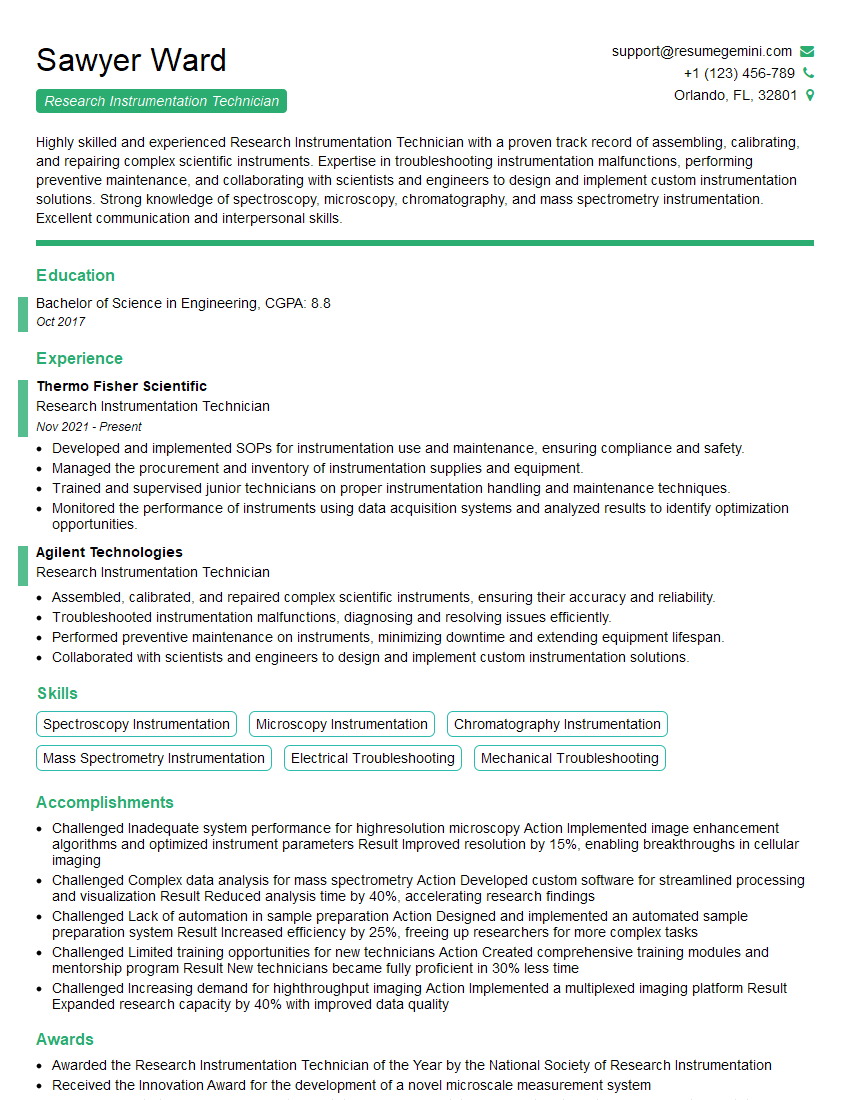Are you a seasoned Research Instrumentation Technician seeking a new career path? Discover our professionally built Research Instrumentation Technician Resume Template. This time-saving tool provides a solid foundation for your job search. Simply click “Edit Resume” to customize it with your unique experiences and achievements. Customize fonts and colors to match your personal style and increase your chances of landing your dream job. Explore more Resume Templates for additional options.

Sawyer Ward
Research Instrumentation Technician
Summary
Highly skilled and experienced Research Instrumentation Technician with a proven track record of assembling, calibrating, and repairing complex scientific instruments. Expertise in troubleshooting instrumentation malfunctions, performing preventive maintenance, and collaborating with scientists and engineers to design and implement custom instrumentation solutions. Strong knowledge of spectroscopy, microscopy, chromatography, and mass spectrometry instrumentation. Excellent communication and interpersonal skills.
Education
Bachelor of Science in Engineering
October 2017
Skills
- Spectroscopy Instrumentation
- Microscopy Instrumentation
- Chromatography Instrumentation
- Mass Spectrometry Instrumentation
- Electrical Troubleshooting
- Mechanical Troubleshooting
Work Experience
Research Instrumentation Technician
- Developed and implemented SOPs for instrumentation use and maintenance, ensuring compliance and safety.
- Managed the procurement and inventory of instrumentation supplies and equipment.
- Trained and supervised junior technicians on proper instrumentation handling and maintenance techniques.
- Monitored the performance of instruments using data acquisition systems and analyzed results to identify optimization opportunities.
Research Instrumentation Technician
- Assembled, calibrated, and repaired complex scientific instruments, ensuring their accuracy and reliability.
- Troubleshooted instrumentation malfunctions, diagnosing and resolving issues efficiently.
- Performed preventive maintenance on instruments, minimizing downtime and extending equipment lifespan.
- Collaborated with scientists and engineers to design and implement custom instrumentation solutions.
Accomplishments
- Challenged Inadequate system performance for highresolution microscopy Action Implemented image enhancement algorithms and optimized instrument parameters Result Improved resolution by 15%, enabling breakthroughs in cellular imaging
- Challenged Complex data analysis for mass spectrometry Action Developed custom software for streamlined processing and visualization Result Reduced analysis time by 40%, accelerating research findings
- Challenged Lack of automation in sample preparation Action Designed and implemented an automated sample preparation system Result Increased efficiency by 25%, freeing up researchers for more complex tasks
- Challenged Limited training opportunities for new technicians Action Created comprehensive training modules and mentorship program Result New technicians became fully proficient in 30% less time
- Challenged Increasing demand for highthroughput imaging Action Implemented a multiplexed imaging platform Result Expanded research capacity by 40% with improved data quality
Awards
- Awarded the Research Instrumentation Technician of the Year by the National Society of Research Instrumentation
- Received the Innovation Award for the development of a novel microscale measurement system
- Recognized with the Excellence in Instrumentation Award for outstanding contributions to research instrumentation
Certificates
- ISO 17025:2017
- AS9100D
- Certified Calibration Technician (CCT)
- Certified Instrumentation Technician (CIT)
Career Expert Tips:
- Select the ideal resume template to showcase your professional experience effectively.
- Master the art of resume writing to highlight your unique qualifications and achievements.
- Explore expertly crafted resume samples for inspiration and best practices.
- Build your best resume for free this new year with ResumeGemini. Enjoy exclusive discounts on ATS optimized resume templates.
How To Write Resume For Research Instrumentation Technician
- Quantify your accomplishments whenever possible. Use specific numbers and metrics to demonstrate the impact of your work.
- Highlight your skills and experience with specific instrumentation techniques and software.
- Tailor your resume to each job you apply for. Make sure to highlight the skills and experience that are most relevant to the position.
- Proofread your resume carefully before submitting it. Make sure there are no errors in grammar or spelling.
Essential Experience Highlights for a Strong Research Instrumentation Technician Resume
- Assemble, calibrate, and repair complex scientific instruments, ensuring their accuracy and reliability.
- Troubleshoot instrumentation malfunctions, diagnosing and resolving issues efficiently.
- Perform preventive maintenance on instruments, minimizing downtime and extending equipment lifespan.
- Collaborate with scientists and engineers to design and implement custom instrumentation solutions.
- Develop and implement SOPs for instrumentation use and maintenance, ensuring compliance and safety.
- Manage the procurement and inventory of instrumentation supplies and equipment.
Frequently Asked Questions (FAQ’s) For Research Instrumentation Technician
What is the role of a Research Instrumentation Technician?
Research Instrumentation Technicians are responsible for the maintenance and repair of scientific instruments used in research laboratories. They work closely with scientists and engineers to ensure that the instruments are functioning properly and that the data collected is accurate.
What are the qualifications for a Research Instrumentation Technician?
Research Instrumentation Technicians typically have a bachelor’s degree in engineering, physics, or a related field. They also have experience with a variety of scientific instruments and software.
What are the career prospects for a Research Instrumentation Technician?
Research Instrumentation Technicians can work in a variety of settings, including universities, hospitals, and research laboratories. They can also work for companies that manufacture and sell scientific instruments.
What are the challenges of being a Research Instrumentation Technician?
Research Instrumentation Technicians can face a variety of challenges, including working with complex and delicate equipment, troubleshooting problems, and meeting deadlines.
What are the rewards of being a Research Instrumentation Technician?
Research Instrumentation Technicians can enjoy a variety of rewards, including working with cutting-edge technology, making a difference in the lives of others, and having a stable and rewarding career.